- in European Union
- in European Union
- within Privacy, Government and Public Sector topic(s)
Why Choose Malta for Aircraft Registration?
Malta's strategic location, solid legal structure, and aviation-friendly policies make it a highly appealing option for aircraft registration. The Aircraft Registration Act, Chapter 503 of the Laws of Malta, aligned with international aviation agreements such as the Cape Town Convention, guarantees a secure and transparent procedure for aircraft owners, lessors, and financiers.
Beyond legal and operational efficiencies, registering an aircraft in Malta offers several key advantages:
- Legal Certainty: A well-established framework ensuring robust protection for owners and financiers.
- Tax Regime: Competitive tax rates and VAT benefits, particularly for leasing arrangements.
- Flexible Ownership Structure: Allows both EU and non-EU entities to register aircraft under specific conditions.
- Efficient Regulatory Oversight: A responsive regulatory authority with a streamlined process, overseen by the Civil Aviation Directorate (CAD) within Transport Malta.
- Secure Financial Environment: Solid protections for financiers and lessors through international agreements.
- Reputation and Compliance: Malta's adherence to high EU regulatory and safety standards.
Eligibility for Aircraft Registration in Malta
The eligibility criteria for aircraft registration vary depending on whether the aircraft is for private or commercial use. The following entities are permitted to register an aircraft:
Aircraft Registration For Private Use:
- Maltese citizens, or individuals from an EU/EEA member state, or Switzerland;
- Business entities established in the above-mentioned jurisdictions; or
- Citizens or entities from approved jurisdictions referred to under Legal Notice 186 of 2011, provided they have the legal right to own or operate an aircraft, appoint a local resident agent in Malta, and do not use the aircraft for the provision of air services for commercial purposes.
Aircraft Registration For Commercial Use:
- The Government of Malta;
- Maltese citizens, or individuals from an EU/EEA member state, or Switzerland; or
- Companies registered in Malta or the EU, where at least 50% ownership and effective control is held by the Maltese government.
The Aircraft Registration Process
The process of registering an aircraft in Malta is designed to be clear and efficient. The below are the key steps involved:1. Application Submission
The applicant submits a completed application form to the CAD, providing details on the aircraft, ownership structure, and intended use.
2. Document Review
The application must be accompanied by various documents, which are reviewed by the CAD. The required documents will be assessed on a case-by-case basis and may vary depending on the circumstances, as required by Transport Malta officials. Certain documents required, include, but are not limited to, the following:
- Proof of ownership, such as a Bill of Sale or a Lease Agreement;
- Declaration and Acceptance of Appointment of Resident Agent (if applicable);
- Certificate of Good Standing, for corporate applicants;
- Certificate of de-registration from the previous registry (if applicable);
- Legal Opinion, for international registrants;
- Statement of registered mortgages or encumbrances;
- Certificate of insurance;
- Power of attorney (if necessary)
3. Technical Inspection
The aircraft undergoes an inspection by a technical
manager, to ensure compliance with both Maltese and international
aviation safety standards. This typically includes
reviewing logbooks and maintenance records, verification of
modifications and technical documentation, and confirming adherence
to EASA safety regulations.
Following a successful review, the CAD issues a Certificate
of Registration, listing the aircraft on the Maltese National
Aircraft Register and a Certificate of Airworthiness, if
all technical requirements are met.
4. Issuance of Certificates
Following a successful review, the CAD issues a Certificate of Registration, listing the aircraft on the Maltese National Aircraft Register and a Certificate of Airworthiness, if all technical requirements are met.
5. Operational Approvals for Commercial Aircraft
Aircraft intended for commercial purposes, must meet rigours safety and operational standards. In such cases, the aircraft must obtain additional certifications, including an Air Operator Certificate (AOC) and Air Operator License (AOL). The former verifies the aircraft's safety and operational capabilities, whilst the latter is required for commercial air services. Additionally, compliance with European Union Aviation Safety Agency (EASA) regulations and ongoing airworthiness inspections are mandatory.
6. Fees
The registration fees depend on the aircraft's maximum take-off mass and are set by Transport Malta.
The Resident Agent for Non-Maltese registrants
For non-Maltese registrants from approved jurisdictions, appointing a resident agent is obligatory. The resident agent acts as the official point of contact between the registrant and the Maltese authorities, ensuring communication is maintained and compliance with local laws is met. The resident agent is also responsible for representing the registrant in legal matters and ensuring that all legal and administrative obligations are fulfilled, including signing and submitting any necessary declarations, forms or documents mandated by Maltese law. The resident agent must either be an individual with Maltese citizenship or residency, to ensure a tangible presence and connection to Malta, or a legal entity registered in Malta, complying with local regulations.
Conclusion
Malta's aircraft registration framework offers a compelling and efficient solution for aircraft owners, operators and financiers alike. With its combination of legal certainty, tax benefits and flexible operational regulations, Malta continues to be a leading destination for aviation businesses. Whether for private or commercial use, registering an aircraft in Malta ensures a secure, efficient, and business-friendly environment that aligns with global aviation standards.
Article written by Dr. Daphne Vassallo, Lawyer
The content of this article is intended to provide a general guide to the subject matter. Specialist advice should be sought about your specific circumstances.


